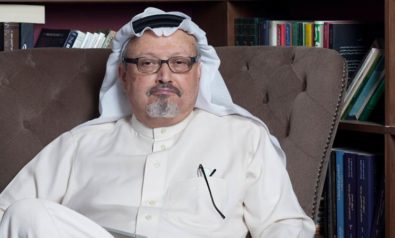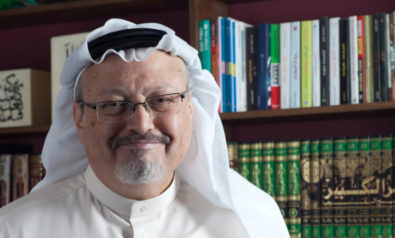The US must lead with a principled position following Jamal Khashoggi’s assassination, but this will require a type of diplomacy not yet seen in this administration.
Information about the shocking and brazen torture and execution of Saudi journalist Jamal Khashoggi spills out now with stomach-churning regularity. All indications point to Saudi Arabia’s top leadership’s culpability. Unable to justify or explain the inconceivably barbaric and contemptible act, the Riyadh regime responded first with denial and then shifted to a new storyline to dodge what increasingly appears to be direct responsibility for this heinous criminality.
There are several aspects of the grisly crime that bear significantly on the character of the current Saudi regime, its future and the US-Saudi relationship. The first is that for Saudi Arabia, its relationship with the US is its oldest and most important. There is no overstating its prominence in Saudi foreign, economic and security affairs. Since the founder of the modern Saudi state, King Abdul Aziz al-Saud, or Ibn Saud, first met with President Franklin D. Roosevelt aboard the USS Quincy on the Great Bitter Lake outside the Suez Canal in the waning days of World War II, the US has been the one and only nation to which Saudi kings have turned for security, counsel and support. While also of vital strategic importance to the US, for the kingdom it is its foreign policy touchstone and security blanket.
A Series of Irrational Acts
Second, this incident must be viewed in light of other actions and behavior of the Saudi leadership since King Salman ascended to the throne in January 2015, and especially since his son, Mohammed bin Salman (MBS), was promoted to crown prince in June 2017. There is the bloody civil war in Yemen, which, after more than three years, shows little prospect of ending despite billions expended by the Saudi government. The Saudi armed forces have been accused of repeated human rights violations in the war. There is also the inexplicable blockade of Qatar and consequential weakening of what had been the Middle East’s most effective regional alliance, the Gulf Cooperation Council.
In November 2017, the Saudis forcibly detained the prime minister of Lebanon, Saad Harari, and forced him to issue a public resignation from Riyadh while on an official visit. In the same month, Saudi security authorities, acting on orders from MBS, detained nearly 200 Saudi business executives, including royal family members and senior officials, on charges of corruption. Many observers believe that the charges were trumped up to justify a purge of those suspected of harboring opposing views. There have been multiple arrests of dissidents and critical bloggers inside the kingdom, too.
Then, last June, the Saudi leadership clashed with the government of Canada over its remarks critical of the kingdom’s human rights record, including arrests of human rights advocates. Riyadh expelled the Canadian ambassador, withdrew Saudi students studying in Canada and severely curtailed its economic relations with Ottawa. And while Saudi Arabia’s angst over bordering Iran is understandable, the Saudi leadership has remained adamantly opposed to any dialog with the Islamic Republic, ratcheting up regional tensions to a feverish pitch.
All of these seemed questionable and suspect at the time. But today they are clear indicators of a leadership with questionable judgement. It appears to be thrashing to protect itself from enemies — real and imagined — and to sanitize the public space of all criticism. Given such an approach, the only thing shocking about the murder of Jamal Khashoggi is its brazen, careless manner and calculated brutality.
Many questions surface in considering such an act. Has too much power been concentrated in the hands of one man? Has it led to effective disinhibition, in which the normal constraints of human beings — as well as leaders — are repressed, and all actions become justified just because the one in power can do them?
Questionable Judgement
Third, having by all accounts indeed committed this crime and now faced with calls from around the world for accountability and full transparency, the Saudi leadership faces one of its most existential crises in recent history. How does it respond in order to satisfy these demands, mollify critics and yet preserve the status quo in Saudi Arabia?
The Saudi leadership has always been purposely opaque — not unusual for a family that runs a country of the size, wealth and influence of the kingdom. It has generally done a creditable job of avoiding crises, often relying on American advice and support. Moreover, Saudi kings have relied on the counsel of the family’s top princes, both those in government as well as out, in order to keep its foreign and domestic policies on a largely steady course. But with MBS being catapulted over family members to the kingdom’s number two position and de facto decision maker, it isn’t clear whether family members are even consulted today, and whether the crown prince enjoys their support the way his predecessors have.
Last year’s round up, detention and purge of perceived MBS opponents no doubt did little to endear him. So, it may be fair to surmise that even if they are proffering advice, unless it accords with the crown prince’s own instincts, it’s likely disregarded.
Meanwhile, the US has stepped down from its historic role as counselor. Today, the Trump administration, represented before the Saudis by the president’s son-in-law Jared Kushner, may be enabling Mohammed bin Salman. That would appear to be the case in Yemen, the blockade of Qatar and other matters. Reasons for that are myriad. However, the administration wants to maintain Saudi support for its Iran policy — not a heavy lift for the Iran-phobic Saudi leadership — and is probably looking for ways to distinguish its overall Middle East policies from those of Donald Trump’s predecessors. That suggests disengagement and turning the keys over to, in this case, the Saudis. It may be, therefore, that MBS felt he had a green light to continue his approach of eliminating opponents, like the influential and eloquent Jamal Khashoggi.
So, the leadership — the king and the crown prince — themselves at the center of attention now, must grapple with the decision of what to do to silence worldwide condemnation. How can this leadership genuinely hold accountable those responsible for Khashoggi’s assassination but still maintain credibility and confidence outside and inside the kingdom?
US Senator Lindsey Graham described the crown prince as “unhinged” and a “rogue killer” and said he “must go.” The senator may be right in his view of meting out a suitable sentence for the unspeakable crime. But no sitting king — or crown prince acting in his stead — has been forced to abdicate since King Saud bin Abdul Aziz al-Saud in 1964.
The Upper Hand
Last and perhaps most important in this affair is what the US will do. The president has been loath to condemn or even criticize the Saudis, despite the mounting evidence. He prudently dispatched Secretary of State Mike Pompeo to Riyadh, who elicited a commitment of transparency and accountability from the king and the crown prince. But this has never been a regime known for its transparency. Moreover, given that at least one of them has been implicated, how transparent can we expect the Saudi investigation to be?
For an administration that has gone out of its way to de-emphasize human rights in its foreign policy, this is an especially difficult issue. On the one hand, the Saudi-ordered, mafia-style “hit” on Khashoggi contravenes the very core of America’s values and crosses every line of acceptable human behavior. It demands a strong response. On the other, though, the Saudi relationship is a critical one for the US, and a diminished Saudi leadership or weaker government isn’t good for either country. It’s the textbook interests-versus-values tug of war in American foreign policy, only accentuated now because this administration pays little attention to American values.
One fact is clear: The US cannot be seen as complicit in or collaborating with a whitewash. Meeting with the Saudis as Pompeo did earlier this week was a sensible first step. Difficult issues are best addressed with Saudi Arabia in the privacy of a high-level diplomatic exchange. Addressing too much in the public eye will force the Saudis to withdraw, further depriving themselves of desperately needed perspective and balance in this crisis. That is patently not in anyone’s interest.
If the US accepts anything less than full Saudi cooperation and accountability, it truly will be seen as abandoning the field to autocrats like Russia’s Vladimir Putin, North Korea’s Kim Jong-un, the Philippines’ Rodrigo Duterte, Egypt’s Abdel Fattah al-Sisi, Venezuela’s Nicolás Maduro and the rest of the world’s thugs-in-waiting.
For all these reasons then, the Khashoggi affair may be as great a challenge for the US as it is for Saudi Arabia. However, America, as the indispensable ally of the kingdom, holds the upper hand. It can get what it wants. It must lead with a principled position reflecting American core values and then follow with actions necessary to ensure maintenance of the vital partnership. It is possible. But it will require a type of diplomacy not yet seen in this administration.
The views expressed in this article are the author’s own and do not necessarily reflect Fair Observer’s editorial policy.
Support Fair Observer
We rely on your support for our independence, diversity and quality.
For more than 10 years, Fair Observer has been free, fair and independent. No billionaire owns us, no advertisers control us. We are a reader-supported nonprofit. Unlike many other publications, we keep our content free for readers regardless of where they live or whether they can afford to pay. We have no paywalls and no ads.
In the post-truth era of fake news, echo chambers and filter bubbles, we publish a plurality of perspectives from around the world. Anyone can publish with us, but everyone goes through a rigorous editorial process. So, you get fact-checked, well-reasoned content instead of noise.
We publish 2,500+ voices from 90+ countries. We also conduct education and training programs
on subjects ranging from digital media and journalism to writing and critical thinking. This
doesn’t come cheap. Servers, editors, trainers and web developers cost
money.
Please consider supporting us on a regular basis as a recurring donor or a
sustaining member.
Will you support FO’s journalism?
We rely on your support for our independence, diversity and quality.

















